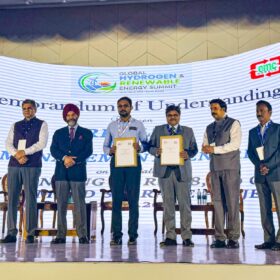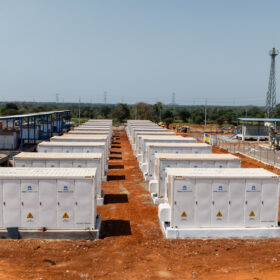The fourth day of the 41st Steering Committee Meeting of the International Partnership for Hydrogen and Fuel Cells in the Economy (IPHE), being hosted by India in New Delhi during March 18 – 22, 2024, has been organized as a Stakeholders’ Consultation Day, as part of the Industry Outreach Programme of the Steering Committee Meeting. The Programme, held at Sushma Swaraj Bhawan in New Delhi on March 21, 2024, aimed to foster collaboration and dialogue among key stakeholders to advance the development of clean and green hydrogen technologies.
“Green Hydrogen can drastically alter the nation’s energy supply chain over the next 20 years”
Addressing the gathering at the inaugural session of the Industry Outreach Programme, Special Secretary (Economic Relations and Development Partnership Administration), Ministry of External Affairs, Government of India, Shri P. Kumaran, stated that Green Hydrogen is emerging globally as a solution for the journey towards Clean Energy transition, as it is well-placed to contribute more effectively than other options, in hard-to-abate sectors, long-term energy storage and mobility. He added that given India’s abundant renewable resources and a favourable ecosystem, Green Hydrogen has the potential to drastically alter the structure of the nation’s energy supply chain over the next 20 years, with a substantial positive impact on the economy.
“Green Hydrogen can help decarbonize economy and address Climate Change”
Additional Secretary, Ministry of New & Renewable Energy, Shri Sudeep Jain pointed out the adverse impacts of climate change and highlighted the need for immediate actions to address the challenge. He mentioned that decarbonisation of the economy including through the application of Green Hydrogen will help in overcoming these challenges.
“If India achieves National Green Hydrogen Mission targets, it will put the country at the forefront of global hydrogen development”
Vice Chair, IPHE, Dr. Noe Van Hulst appreciated the efforts being made by India in promoting green hydrogen and stated that the participating countries of IPHE are impressed by India’s National Green Hydrogen Mission, its ambitious targets and the policies and regulatory framework being implemented to achieve it. He said that if India achieves these targets, it will put the country at the forefront of global hydrogen development. He expressed his gratitude to his Indian counterpart for the hospitality and successful organisation of the Steering Committee Meeting.
“WTO and UN need to play supporting role in facilitating Green Hydrogen adoption”
Chairperson, CII Taskforce on Green Hydrogen and Chairperson, Avaada Group, Shri Vineet Mittal lauded the role of IPHE in promoting Hydrogen economy. He added that the WTO and the UN need to play a supporting role to facilitate adoption of Green Hydrogen. He stressed that India needs policy autonomy to pursue the path of decarbonisation.
“Green Hydrogen ecosystem is gradually developing in all parts of the country”
Joint Secretary, Ministry of New & Renewable Energy, Government of India, Shri Ajay Yadav welcomed the IPHE chair, other guests and explained the significance of India’s Hydrogen policy framework. He welcomed the favourable response of Indian Industry in participating in government policies and programmes to achieve decarbonisation and the massive deployment of Hydrogen. He listed out the various projects in the Green Hydrogen space in India and informed that a Green Hydrogen ecosystem is gradually developing in all parts of the country.
“Need to develop Green Hydrogen Standards which are Robust and Globally Accepted”
The Inaugural Session of the Programme was followed by four distinct panel discussions.
The first panel titled “The Significance of Standards & Certification in the Clean / Green Hydrogen Sector,” discussed the complexity involved in developing these standards, the present status of ongoing processes, key challenges, and possible solutions. The focus was on ensuring that standards for Green Hydrogen are robust and accepted internationally
“Safety is Paramount for present and future Green Hydrogen Technologies”
The second panel discussion was on “Maximizing Safety, Efficiency, and Sustainability in the Clean / Green Hydrogen Sector”. Panellists were of the consensus view that safety is paramount, considering the unforeseen hazards posed by these new technologies and deliberated on making present and future green hydrogen technologies safe, along with adequate measures during emergencies.
“Need Trade Policies which facilitate Export of Green Hydrogen”
The topic of the third panel was “International Trade Policies in the Clean / Green Hydrogen Market”. The discussion emphasized the importance of collaboration among partnering countries to create trade policies that facilitate the export of Green Hydrogen and its derivatives. The session focused on achieving supply-chain resilience for raw materials and implementing best practices through joint efforts.
“Financial Innovation crucial for Scaling Green Hydrogen”
The panellists of the fourth panel titled “Transforming the Clean / Green Hydrogen Economy into Reality: Navigating Financial Pathways,” were of the view that financial innovation is crucial for scaling clean / green hydrogen technologies. Discussions included investment strategies, funding mechanisms, and economic incentives to drive the transition towards sustainable energy solutions. Deliberations also explored the intersection of finance and sustainability, shaping the future landscape of clean / green hydrogen markets.
The Stakeholders’ Consultation Day emphasized the need for commitment of stakeholders to drive the transition towards sustainable energy solutions through collaboration and innovation.





